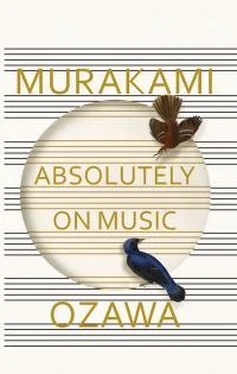MURAKAMI: Meaning, if negotiations had broken down between the two of them, you might have conducted the piece instead of Bernstein … Still, this performance does have a good deal of tension to it.
OZAWA: Sure, sure. It’s a little unpolished, though.
MURAKAMI: Played this slowly, it sounds as if it could fall apart at any moment.
OZAWA: Yes, it’s right on the edge.
MURAKAMI: Come to think of it, when Gould played with the Cleveland Orchestra, he and George Szell couldn’t agree and an assistant took over for Szell. I read that somewhere.
The solo piano section of the first movement begins (5:56).
OZAWA: It’s strangely slow, but playing it like this, Gould makes it work. It doesn’t feel wrong at all.
MURAKAMI: He must have such an acute sense of rhythm. I mean, to be able to keep stretching it out like that, adjusting his sound inside the framework of the orchestra …
OZAWA: He’s got an absolutely solid grasp of the flow of the music. But Lenny’s got it absolutely right, too. He’s putting his heart and soul into it.
MURAKAMI: But isn’t this piece usually played as a big, passionate outburst?
OZAWA: True, with a lot more passion. You’re right, this performance is not what you’d call passionate.
The piano plays the first movement’s beautiful second theme (7:35).
OZAWA: Here, the slow tempo is just fine. With this second theme. Good, don’t you think?
MURAKAMI: It really is.
OZAWA: Before, the loud section was maybe a little sluggish or unsophisticated, but this really grabs you.
MURAKAMI: Before, you said, “Lenny’s got it absolutely right … He’s putting his heart and soul into it,” but you also said you thought it was not a good idea to get up like that and give a speech before a performance.
OZAWA: No, I don’t think it’s a good idea. But from Lenny, people were willing to accept it, I suppose.
MURAKAMI: I guess you mean it’s better to present music as music, without any added preconceptions. But from his point of view, Bernstein probably wanted to make it clear just who decided on the concept of the performance.
OZAWA: I suppose so.
MURAKAMI: Ordinarily, though, in a concerto, who is “the boss”—the soloist or the conductor?
OZAWA: In the case of a concerto, it’s mostly the soloist who does the heavy rehearsing. The conductor begins working on it maybe two weeks or so before the performance, but the soloist can be wrestling with it for six months or more. The soloist gets totally inside the piece.
MURAKAMI: Okay, but don’t you have situations where the conductor is so far above the soloist that he decides everything without consulting the soloist?
OZAWA: Maybe so. Take the violinist Anne-Sophie Mutter, for example. Maestro Herbert von Karajan discovered her and right away had her recording Mozart and Beethoven concertos. You listen to those, and it’s overwhelmingly Karajan’s world. So then they thought it would be a good idea for her to play with a different conductor for a change, and Karajan chose me. “Do the next one with Seiji,” he said. So we recorded Lalo’s Spanish something-or-other. She was barely twenty years old at the time.
MURAKAMI: Edouard Lalo’s Symphonie espagnole. I’m sure I’ve got a copy of that somewhere.
Rustling sounds as I hunt for the record, which finally turns up.
OZAWA: This is it! This is it! Wow, I haven’t seen this thing for years. The French radio orchestra [Orchestre National de France]. I can’t believe you have this. Even I don’t have a copy. I used to have a bunch of them, but I gave them away or people borrowed them and never brought them back …
Gould and Karajan,
Beethoven Piano Concerto no. 3 in C Minor
MURAKAMI: The main thing I wanted you to listen to today was the Karajan and Gould performance of the Beethoven Third Piano Concerto. It’s not a studio recording. It was recorded live at a 1957 performance in Berlin. With the Berlin Philharmonic.
The orchestra’s long, weighty introduction ends, Gould’s piano enters, and the interplay of the two begins (3:19).
MURAKAMI: Right here, the orchestra and piano are not together, are they?
OZAWA: No, you’re right, they’re out of sync here. Oh, here, too, they come in differently.
MURAKAMI: Does this mean they haven’t completely worked things out in advance during the rehearsals?
OZAWA: No, I’m sure they must have. But in passages like this, the orchestra is usually supposed to adjust to what the soloist is playing …
MURAKAMI: In those days, Karajan and Gould were musicians of very different status, I guess.
OZAWA: Well, sure, it was 1957—that was probably not long after Gould’s European debut.
MURAKAMI: Tell me if I’m wrong, but that whole first three and a half minutes or so, where it’s just the orchestra playing, sounds really Beethovenian to me, tremendously German. But then the young Gould comes in, and it seems he kind of wants to get away from that and loosen it up and make his own music. So then the two sides never quite get together, or they just coolly go off in their own directions and get farther and farther apart. Not that it seems wrong or anything …
OZAWA: Gould’s music is very free. Also, maybe it stems from the fact that he’s Canadian, a non-European living in North America. That might make for a big difference, too. That he doesn’t live in the German-speaking world. By contrast, Maestro Karajan’s got Beethoven solidly rooted inside him and it’s not going to budge. He might as well be out there playing a symphony. Plus he has absolutely no intention of cleverly adapting his style to fit Gould’s.
MURAKAMI: Kind of like, “I’m going to make my music the way it’s supposed to be made and you can do the rest of it any way you choose.” So then in Gould’s solo parts and cadenzas and stuff, he’s creating his own world. But the two never quite meet—they feel like they’re slightly out of kilter.
OZAWA: Which doesn’t seem to bother Maestro Karajan at all, wouldn’t you say?
MURAKAMI: No, not at all. He’s totally immersed in his own world. And Gould’s going along at his own pace as if he’s given up any hope of working together right from the start. It’s as if Karajan is building his music straight up from the ground, and Gould’s looking out at the horizon the whole time.
OZAWA: Interesting, though, isn’t it, listening to it like this? I don’t think there’s any other conductor who could perform a concerto with such complete confidence as though it were a symphony, not giving any thought to the soloist.
Gould and Bernstein,
Beethoven Piano Concerto no. 3 in C Minor
MURAKAMI: Now I’m going to put on an LP of the same Beethoven concerto, but this time it’s a studio recording made in 1959 by Gould and Bernstein with the Columbia Symphony Orchestra (composed of members of the New York Philharmonic), two years after the one with Karajan.
The orchestral introduction. It has a kind of directness, like hurling clay at a stone wall.
OZAWA: This is totally different from Maestro Karajan’s, isn’t it? It’s certainly not a symphony. But the sound of the orchestra is so old-fashioned!
MURAKAMI: I never thought of this performance as old-fashioned before, but listening to it right after the Karajan, it does have a kind of antique sound about it. It’s a newer recording, too.
OZAWA: No, it really is old-fashioned.
MURAKAMI: Could it be the recording?
OZAWA: Well, maybe, but it’s not just that. For one thing, they’ve got the mikes too close to the instruments. Everybody used to do it that way in the States. Maestro Karajan’s recording captures the orchestra’s overall sound.
Читать дальше











